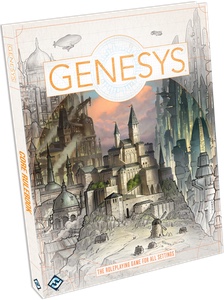Reception
Genesys was a nominee for the 2017 Golden Geek Award in the "RPG of the Year" category. [8] Genesys was #5 on ICv2 's bestseller list for role-playing games in Spring 2018. [9]
Richard Jansen-Parkes, for the UK print magazine Tabletop Gaming in 2018, stated that "Genesys trades specialisation for adaptability, and will likely lose out in direct competition with the well-established masters of certain genres. However, if you want to buy one rulebook for your gaming group and run half a dozen weird and wonderful worlds without learning new rules, it may well be the new top dog of setting-free RPGs". [10] As the system is setting-free, Jansen-Parkes commented that it is highly dependent on the Gamemaster to establish the setting; the Core Rulebook also includes detailed world-building tools and various guidelines for modifying the system for various genres. He highlighted that Genesys is built "on the sturdy chassis of [Fantasy Flight's] recent Star Wars RPGs" and called the 'narrative dice' system "elegant and easy to understand" as it "does away with virtually all the maths and number-crunching traditionally involved with tabletop RPGs". [10]
John Farrell, for Gaming Trend in 2018, rated the Core Rulebook a 60 out of 100 and stated that the "Genesys RPG system is one of the best designed breaths of fresh air the market has had in years, but this core book comes off as a cynical attempt to sell you further books at the cost of important content". [11] Farrell praised the design of the system, calling it "tremendous work", "a true tour de force" and a "brilliant, vibrant collection of rules that I wanted to see so much more of". [11] He commented that the 'narrative dice' are the "make-or break feature of the game". [11] However, Farrell disliked the setting section of the Core Rulebook as the "settings are often tied into FFG products already" without enough information to run them leaving the Gamemaster with the choice of "building it on your own from the ground up or making yet another purchase. [...] There are not enough tools here for anyone who doesn't want to create settings whole cloth for themselves, and even then a lot of help is lacking". [11] Farrell believes that the Core Rulebook "may pay off eventually" once enough additional material is released but the "current state" is insufficient. [11]
Adam Potts, for TechRaptor in 2019, stated that "the core Genesys rulebook allows you to play roleplaying games in any setting you wish, like fantasy or sci-fi, cyberpunk or horror, and the emphasis is on a narrative experience rather than a stat driven roleplaying game [...] The Genesys core rulebook can be used for any setting and includes examples of six settings and six tones to get you started". [12] He highlighted that the core of the system is the 'narrative dice' which means "when the dice are rolled, there are a variety of different ways to interpret them. Maybe you fail the task, but you find out something useful. Maybe you achieve the task, but are injured during the process, or maybe you fail the task and reveal a weakness to an enemy. The difference with this and a stat based RPG system is that you can easily interpret scale of failure or success". [12] In the test session Potts ran, the players had mixed feelings on the dice system ranging from being a "real fan of what the narrative dice system is trying to do" to not enjoying the "propriety dice" and concerns that the "system felt overly clunky". [12]
Reviews
- Cannibal Halfling Gaming [13]
This page is based on this
Wikipedia article Text is available under the
CC BY-SA 4.0 license; additional terms may apply.
Images, videos and audio are available under their respective licenses.
